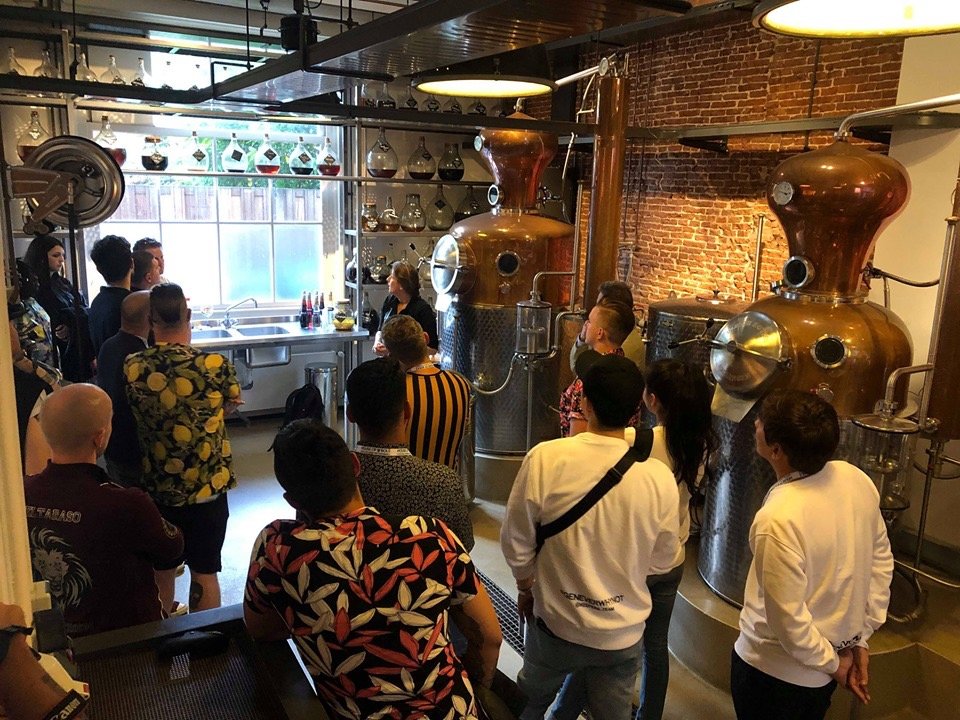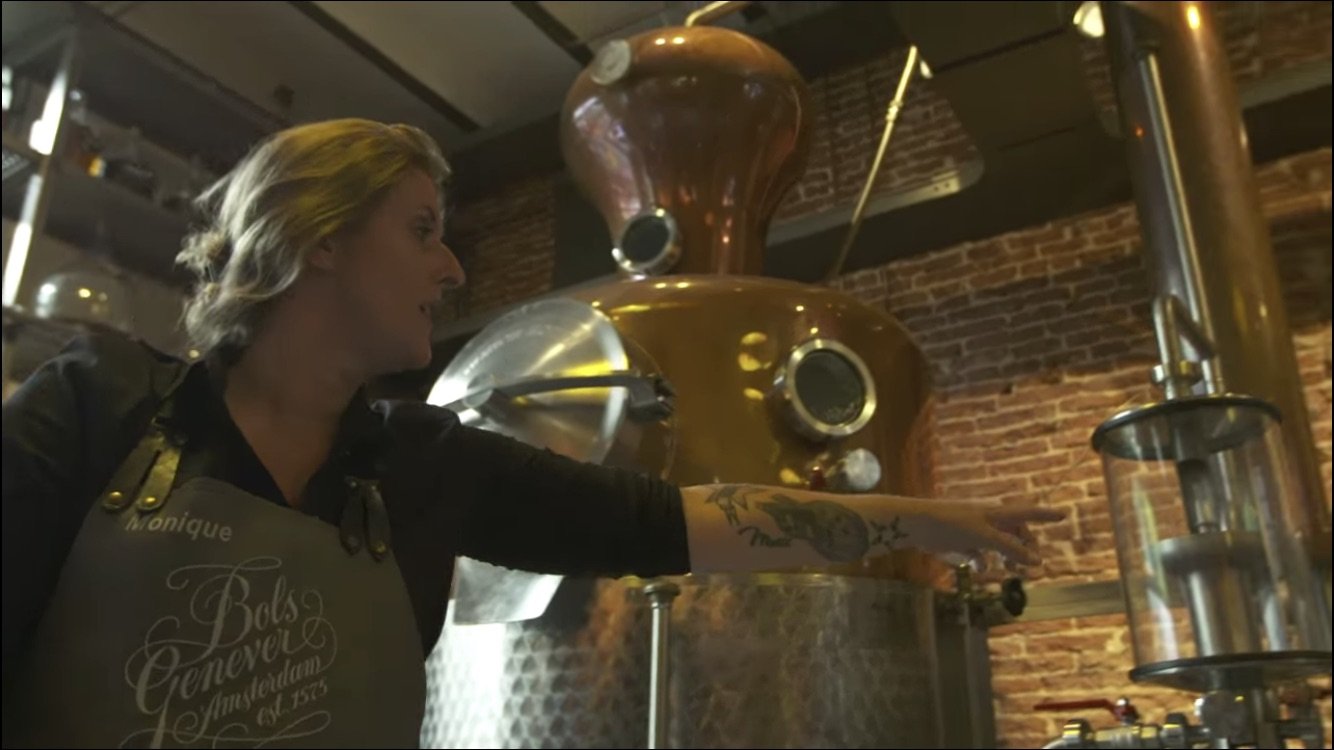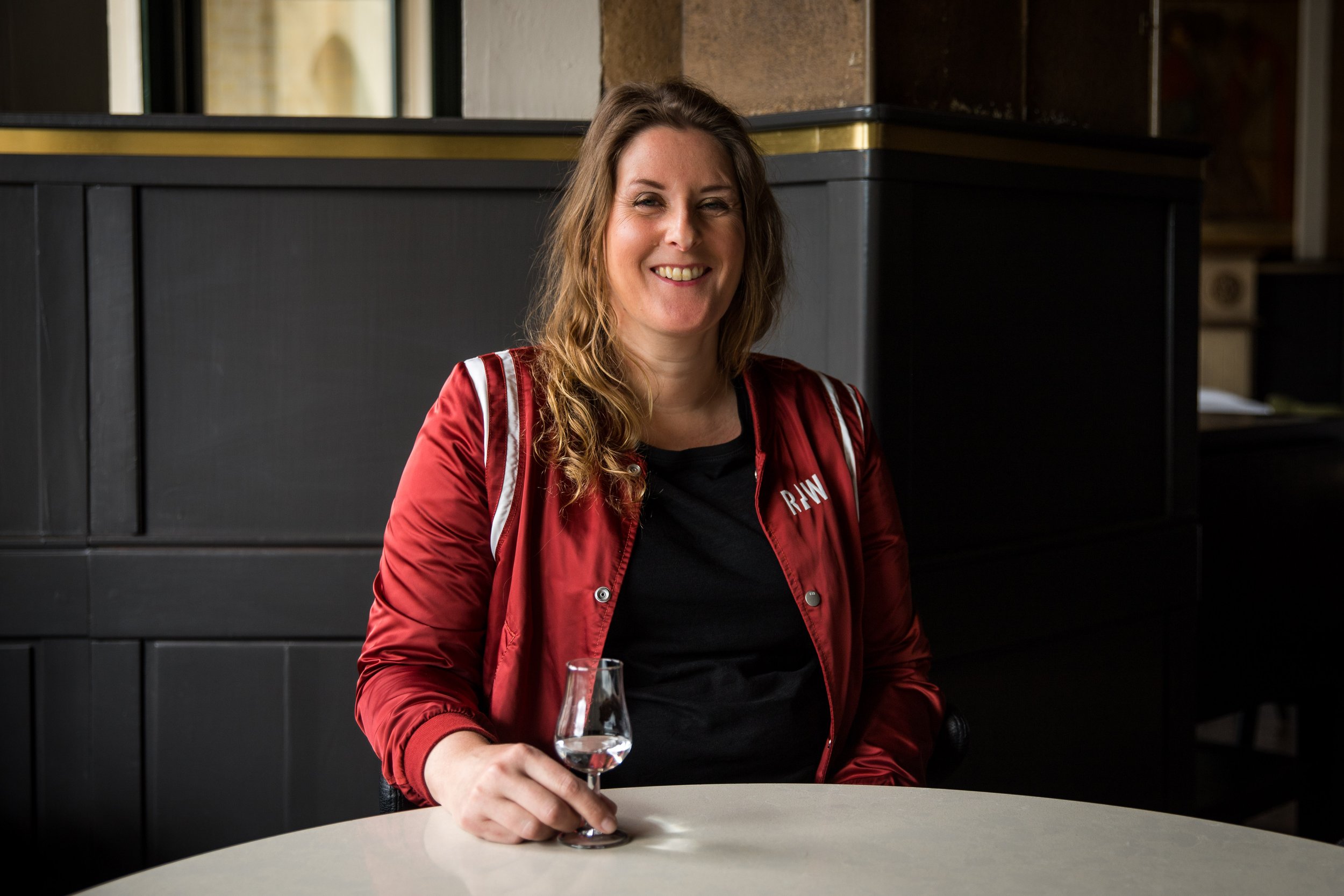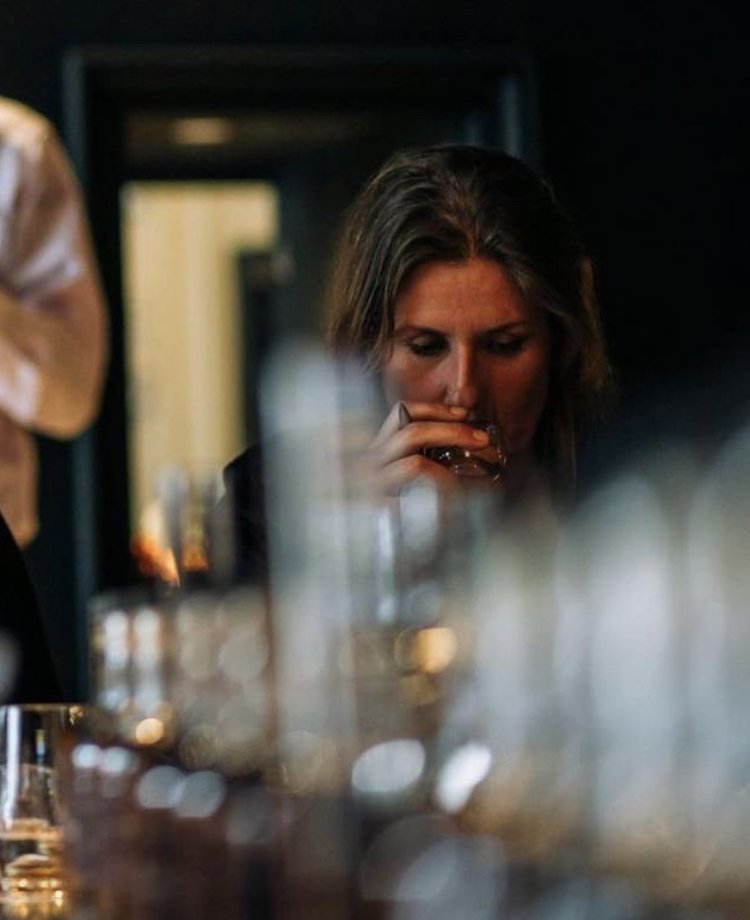Focus on Master Distiller Monique ten Kortenaar: Untamable
In 2013, Monique ten Kortenaar started working at the company, in 2021 she was appointed as the head distiller and distillery manager at the prestigious genever producer Lucas Bols, as well as for Wynand Fockink.
My interview with Monique
Hi Monique, It’s not every day I get to talk to a woman who is head distiller at a world class distillery like Bols. Can you give a little backstory on how you got there?
Hi Sharla! Yes, of course.
I started as a Chemical Analyst and Flavourist Assistant in botanical extracts and flavours and worked as a Product Developer in beverages for a long time after that. Because of a company takeover some jobs got lost and I had to look for another one, which led me to being a Sensory Panel Leader and Quality Coordinator in the food industry - while there weren’t any available product development jobs in the food and beverages industry at the time. When I saw an open position at Lucas Bols for a Quality Manager, I knew I had to apply. After 3,5 years working as a Quality Manager, Piet (Lucas Bols Master Distiller for life, who used to be the head of the department I worked for as well) was looking for a new Distiller in our Distillery. Long story short, I happily ended up being part of the distillery team. The other 2 distillers left after a few years and during CoVid-19 I started running the distillery on the floor, together with a colleague that helped us out once in a while before. Piet retired in July this year and I officially took over the management of the distillery. In the meantime that colleague is now one of our two Junior Distillers who I was able to hire for the Distillery.
I understand your grandfather Jacob was a perfumer. You must have inherited his nose, but did you ever have any involvement with the perfume industry?
Yes, I did inherit his nose. They even tested me on that. It turned out I am a supertaster as well. My grandfather was the one who gave me this huge interest in perfume, hemistry/science, flowers and botanicals and smell in general.
As a little kid, I was outside at my parent’s house taking rosehip flowers and roses from the bushes and tried to make my own ‘perfume’ by soaking them in water ;)
I went to Grasse in France with my parents and my brother to learn more about perfumes when I as a bit older and I really wanted to do something in that direction. I actually wanted to be a perfumer, but at the time - no internet yet - no one could help me on how to, so they advised me to do a chemical laboratory education.
The company where I worked as a Senior Flavorist Assistant and Product Developer Beverages was a company in flavours and fragrances, so there has always been that link. There is a big overlap between these two and as a Flavorist Assistant I learnt how to build up flavours from extracts and individual ingredients which are used a lot in perfumes as well. Flavours are actually ‘perfumes for food and drinks’. (And now do not think negatively about these flavours, because a lot are actually natural).
Having said that, it has always been something I wanted to combine at one point, so you will never know how that turns out…
Do you think women have a better sense of smell than men do?
Again: yes. In general they do. There has been a lot of research about this. And, in general, they can also link memories and emotions better to certain odours, which is important to be able to recognise and describe them.
You have studied as a brewer in Germany. How has that helped you in your distilling job?
The most important overlap there is the fermentation part. You need this fermentation for making malt wine, for genever, as well. Next to that we learnt about off smells which can occur during and after the production process. At one point we had a small defect on smell during a fermentation in the distillery. Because of this knowledge I could link it to a problem with the grains and found out how to be able to get rid of it.
What was the hardest thing you had to learn in becoming a master distiller?
Theory doesn’t always match with practice. It doesn’t always work out the way you think, although the knowledge helps a lot of course. (And; you can never stop learning).
Plus - a sentence that I use a lot when talking about development - it is trial and error. Do not be afraid to try and try again. Learn from your mistakes.
The same goes for learning about how to run a distillery, there is more to it than you think.
Besides that; it is a job that sometimes is ‘over-romanticized’. Of course it has a lot of romantic sides, but do not forget about the heavy weights to be lifted, cleaning stills with black sticky substances, etc.
But in the end, I still love it.
Did you encounter resistance in the distillery because you are a woman?
More from external sides, unfortunately, yes. It sometimes means you have to prove yourself more. But I also get a lot of positive feedback, especially from the hospitality industry.
Being a female Distillery Manager also gives some extra challenges, but also has its advantages. It goes both ways. It should not matter, really. It is about being great at what you do and loving it, not about what other people think.
Can you give us some information on the House of Bols?
The House of Bols is a museum with a lot of information and history about the brand and company PLUS about genever, the various processes, botanicals and the products. There is a nosing room, where you can smell and test if you recognise the different flavours of the liqueurs, a genever room, a botanical room and more. It is more an experience than a museum actually. And at the end of the tour you will be able to do a workshop at an actual bar (you need to book this separately) and have a cocktail (or two) at the mirror bar.
What is the difference between genever and gin?
The biggest difference is the presence of malt spirit (malt wine). Genever has to have malt spirit, gin does not.
Besides that; with gin the juniper berry character needs to be the dominant one of all the botanicals, with genever it has to be perceivable, but not dominant.
Genever (Jenever) has a PGI (Protected Geographical Indication), gin has not.
What about Wynand Fockink? Wasn’t it a separate company in the past?
Yes, Bols is from 1575, Wynand Fockink from 1679. In 1954 Lucas Bols took over Wynand Fockink. They did not use the distillery yet at that point, but the recipes were owned by Lucas Bols. In 2013 the distillery was renovated and became the Lucas Bols Distillery. From that moment on we are distilling the heart of the Lucas Bols products at this location.
But we are also still producing Wynand Fockink products over there.
What do they produce?
They produce genevers, gin, liqueurs, fruit brandies and bitters.
What new products are you developing for Bols?
Unfortunately I cannot tell anything about that, but I am working closely together with the Lucas Bols Innovation Team and am responsible for the wood ageing part. Recently we added some bottled cocktails (and tubes) to our portfolio and I have been working on the development of Damrak VirGin, which has been available for some time now.
For Wynand Fockink there are some interesting projects as well. One I can mention: a peated and smoked genever. We already had a genever like this once in a while, but in really small volumes. It was not part of the regular portfolio. People have been asking for it and I am now looking into making one that is more cost effective to make (one of the reasons why we did not have it on a regular basis).
You were at the Perfect Serve event in Amsterdam; does your job involve a lot of traveling and conducting master classes?
I was at the Perfect Serve Barshow for my own brand/product; OTENBA.
For Bols there is not a lot of travelling involved (yet) or masterclasses. I do give ‘tours’ in the distillery to distributors and bars though.
For OTENBA I do travel, now and then, and am giving masterclasses. These involve a general masterclass about genever as well (which involve Bols and Wynand Fockink products too).
Tell me more about OTENBA.
OTENBA is Japanese for a ‘rebellious girl’, or sort of ‘tomboy’. A girl that does not fit with traditional standards. A Japanese friend from the industry told me about this word (and others) coming from the Dutch language. He called me Miss Otenba at one point. Otenba comes from the Dutch word ‘ontembaar’ which means untamable. The Japanese word fit perfectly with the Japanese and other Asian botanicals used in the product, and then again the link to my grandfather who used to be a perfumer for the Asian market.
How and why did you create it?
I started with both gin and genever botanicals which are traditionally used and added some I really wanted to use. Plus...I based it on a malt spirit with rye, barley and corn (also traditionally used in old recipes for genever).
As genever is our local spirit and is seen by many, especially young people, as a ‘old fashioned’ type of spirit (the one your grandfather used to drink), I wanted to create something that might get these people (and gin lovers) to try genever (because it is actually a young genever).
Tell me more about OTENBA.
OTENBA is Japanese for a ‘rebellious girl’, or sort of ‘tomboy’. A girl that does not fit with traditional standards. A Japanese friend from the industry told me about this word (and others) coming from the Dutch language. He called me Miss Otenba at one point. Otenba comes from the Dutch word ‘ontembaar’ which means untamable. The Japanese word fit perfectly with the Japanese and other Asian botanicals used in the product, and then again the link to my grandfather who used to be a perfumer for the Asian market.
How and why did you create it?
I started with both gin and genever botanicals which are traditionally used and added some I really wanted to use. Plus...I based it on a malt spirit with rye, barley and corn (also traditionally used in old recipes for genever).
As genever is our local spirit and is seen by many, especially young people, as a ‘old fashioned’ type of spirit (the one your grandfather used to drink), I wanted to create something that might get these people (and gin lovers) to try genever (because it is actually a young genever).
Was it created specifically for bartenders?
Nope, also for consumers. It is in stores already and will be distributed more and more.
Were you ever a bartender?
No. I did my basic bartender training, but never worked behind a bar. Consider me a non-professional home bartender ;) - although I don’t drink at home that much really. I liked to go to bars and drink cocktails made by my bartender friends :)
You seem to like new challenges; where do you see yourself in five years?
I am known for keeping myself busy (laughs). There is still a lot to learn and explore, so that will be something I will be doing in the coming years. I will never stop learning.
More innovations, more product development, more knowledge, bringing the distillery and products to a next level. And keep on promoting genever to give this category what it deserves.
Are you involved in any associations or causes?
I am part of ‘Women of the Vine & Spirits’, member of the ‘Institute of Brewing and Distilling’ and founded (with my former colleague) the “Aletta Hanemans Gilde’, a guild for female brewers and distillers.
I am already so busy, so at the moment I will probably leave it like this for a while, but who knows ;)
You like tattoos, is that a barrel on your arm? Tell me about your tattoos.
Yes, I do. I have a lot. I recently added a barrel on my lower arm. I have wanted this one for quite some time already. Now I am responsible for the casks management as well, it was time. It represents my job as a distiller in general and also being brand ambassador for the Scotch Malt Whisky Society, but symbolically too; good things take time.
All of my tattoos symbolise a part my life, happy or sad. So they are actually all special to me.
There are a few really personal ones, but the ones I like to mention are the ones with my kids; on my upper back there is a heart with two hearts entwined for my twins and their initials on my wrist, plus I have one for my youngest son with name in a star on my lower arm.
I also have one for my grandfather; on my upper arm there is an old type of perfume bottle, and around it are some of the flowers he used most often in his perfumes.
Five questions for Monique
Your superpowers?
Enthusiasm and perseverance.
Your favorite cocktails?
Martinez and Daiquiri.
Your nerdiest hobby?
Reading scientific journals/researches about aroma components in botanicals and diving into their chemistry.
Your mentor?
Two again:
Eddy Rietbroek, the senior flavourist I worked for as an assistant. He taught me about creating flavours and beverages. He was the first one who believed in me and acknowledged my smelling and tasting abilities.
Piet van Leijenhorst, my former manager and Master Distiller of Lucas Bols. Do I need to say more here? ;)
Your motto to live by?
Never stop learning and never give up on your dreams!
Where you can find Monique and her projects
The Bols Cocktail experience: bols.com/cocktail-experience
Wynand Fockink: wynand-fockink.nl
OTENBA Amsterdam: otenba.amsterdam




